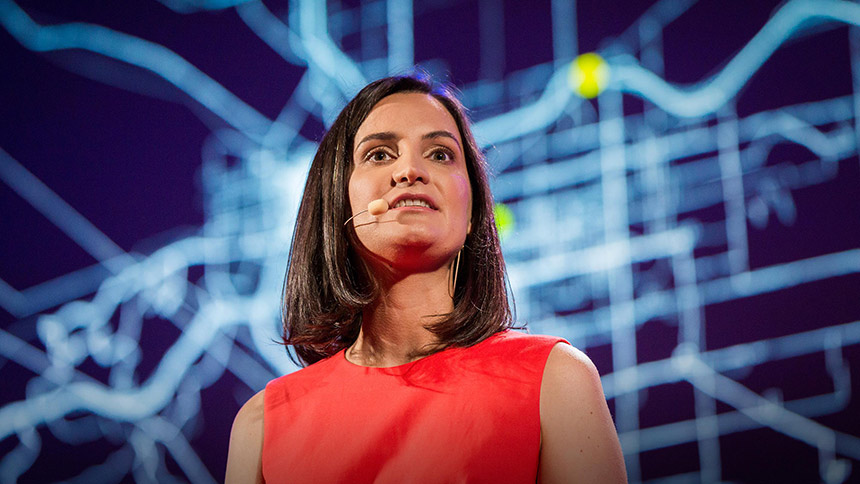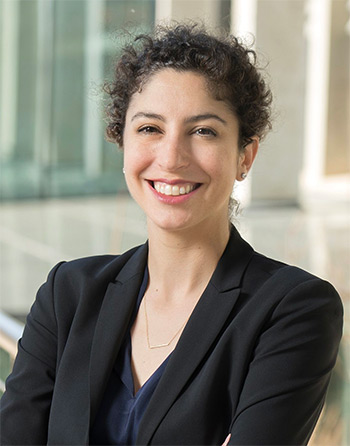
By Andrew Cohen
For nearly three decades, prominent faculty experts have propelled Berkeley Law’s leading position at the intersection of law and technology. Recently, the White House tapped two of them for high-level roles to help influence federal policy improvements.
Clinical Professor Catherine Crump, director of the school’s Samuelson Law, Technology & Public Policy Clinic, is a senior policy advisor for criminal justice for the White House Domestic Policy Council. The council drives the development and implementation of the president’s domestic policy agenda in the White House and across the federal government.

Assistant Professor Rebecca Wexler is a senior policy advisor for science and justice at the White House Office of Science and Technology Policy. The office works to maximize the benefits of science and technology to advance health, prosperity, security, environmental quality, and justice for Americans, advising the President and the executive branch on such matters.
Both professors are among the faculty co-directors of the Berkeley Center for Law & Technology, the hub for Berkeley Law’s top-ranked intellectual property law program and a key driver of its extensive curriculum for tech-related areas.
“I am tremendously excited for Catherine Crump and Rebecca Wexler to have these amazing opportunities in the White House,” Dean Erwin Chemerinsky says. “Their presence reflects Berkeley’s outstanding national reputation and their work will very much advance our public mission of using law to improve our society and our world.”
Eye on surveillance
Crump will work on issues including policing, drug policy, access to justice, and alternatives to incarceration. In May 2022, President Joe Biden issued an executive order that included several actions on the use of technology to help advance effective, accountable policing.
“It really goes to the heart of what we’ve been working on at the Samuelson Clinic,” Crump says. “So I thought I’d have expertise to bring to what the administration is trying to accomplish in advancing safe, accountable policing. I have a longstanding interest in criminal justice, and working on these issues at the White House presented an exciting opportunity to serve the public interest in a new way.”
The council works across many areas, from education to health to immigration, including criminal justice. Crump will help to develop the administration’s criminal justice strategy, oversee implementation of Biden’s executive order on policing, and evaluate legislation in this area. Her role also involves meeting with various constituent groups.
“It has been rewarding to meet so many people who care deeply about improving the state of policing in the United States, from individuals working in their own communities at the grassroots to the families of victims of police violence to law enforcement associations,” Crump says. “It has also been exciting to see how the power of the federal government can be brought to bear to address pressing problems, such as how to help people reintegrate into their communities after incarceration.”
Crump, who spent nine years as a lawyer at the American Civil Liberties Union, focuses her civil liberties advocacy and scholarship on regulating surveillance technology and protecting privacy and free speech in an era of increasingly ubiquitous tracking. She also strives to ensure that new technologies are integrated into the criminal legal system with attention to equity and accuracy.
In addition to having testified before Congress, the European Parliament, and various state legislatures and municipal bodies, Crump appears regularly in the national news media as an expert commentator and opinion writer in outlets such as the Washington Post, Los Angeles Times, and CNN. Her TED talk on the civil liberties problems with automatic license plate readers has been viewed more than 2 million times.
“It goes without saying that many important public policy issues with a connection to law play out in Washington, D.C. Berkeley can bring West Coast perspectives and expertise to that, broadening the exchange of ideas,” Crump says. “This is true of Berkeley students as well as the faculty. Virtually every legal issue has some public policy connection, and knowing a bit about how the power of the federal government interplays with them can enrich the careers even of those who do not intend to work in Washington.”
Berkeley Law students regularly work in Washington through the school’s Field Placement Program and the UCDC Law Program, a full-semester externship initiative in which students learn how federal statutes, regulations, and policies are made, changed, and understood. With faculty members increasingly tapped by government agencies for their expertise, the school’s impact in Washington continues to grow.
Pushing for accountability
The same executive order that prompted Crump’s appointment sparked Wexler’s interest in working with the U.S. Office of Science and Technology Policy. The order tasks the office to lead an interagency process that helps develop safeguards for privacy, civil liberties, and non-discrimination regarding the use of certain policing technologies, like facial recognition technologies and predictive algorithms.
“My own work focuses on enhancing fairness to the criminally accused as new technologies shift the meaning of our legal rules and practices,” says Wexler, a fast-rising scholar whose work has been published in eight leading law school journals as well as peer-reviewed computer science publications. “So this position gives me a chance to help translate some of that scholarly work into practical benefits to serve the public.”
Her teaching and research focus on data, technology, and secrecy in the criminal legal system, and her scholarly theories have twice been proposed for codification into federal law and litigated in multiple courts. Her article “Privacy as Privilege” received the Privacy Law Scholars’ Conference 2020 Reidenberg-Kerr Award for overall merit for a paper by an untenured faculty member, and was named a 2021 “Must Read” article by the National Association of Criminal Defense Lawyers.
“My responsibilities will be to assist the office leadership in the development of policies related to the fairness, rigor, and validity of science and technology in the criminal legal system,” Wexler says. “I’ll also help lead efforts to generate policy that contributes to the oversight of algorithmic and data-centric forensic science and technology.”
Wexler’s op-eds have appeared in the New York Times, Washington Post, Los Angeles Times, The Washington Monthly, and Slate, and her work has been featured on numerous media venues, including National Public Radio.
She relishes extending the law school’s reach and tech expertise to the White House.
“Berkeley Law’s direct engagement with cutting-edge tech policy issues means that we can better prepare our students for a world in which new technologies are reshaping existing legal rules and practice,” Wexler says. “I look forward to bringing the insights I’ll gain from this new role back into the classroom.”